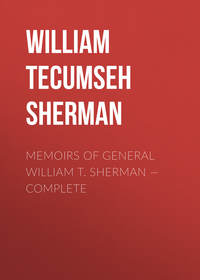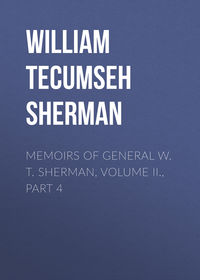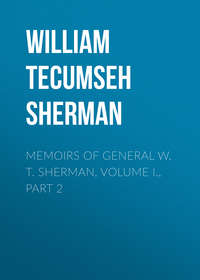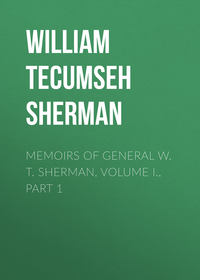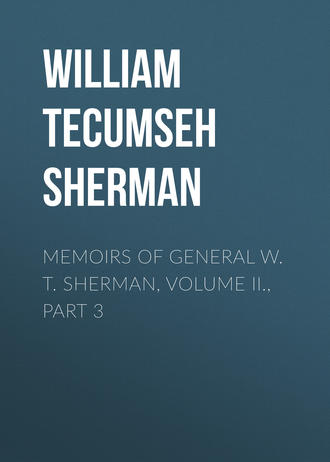 полная версия
полная версияMemoirs of General W. T. Sherman, Volume II., Part 3
Satisfied that Johnston in person was at New Hope with all his army, and that it was so much nearer my "objective;" the railroad, than Dallas, I concluded to draw McPherson from Dallas to Hooker's right, and gave orders accordingly; but McPherson also was confronted with a heavy force, and, as he began to withdraw according to his orders, on the morning of the 28th he was fiercely assailed on his right; a bloody battle ensued, in which he repulsed the attack, inflicting heavy loss on his assailants, and it was not until the 1st of June that he was enabled to withdraw from Dallas, and to effect a close junction with Hooker in front of New Hope. Meantime Thomas and Schofield were completing their deployments, gradually overlapping Johnston on his right, and thus extending our left nearer and nearer to the railroad, the nearest point of which was Acworth, about eight miles distant. All this time a continual battle was in progress by strong skirmish-lines, taking advantage of every species of cover, and both parties fortifying each night by rifle-trenches, with head-logs, many of which grew to be as formidable as first-class works of defense. Occasionally one party or the other would make a dash in the nature of a sally, but usually it sustained a repulse with great loss of life. I visited personally all parts of our lines nearly every day, was constantly within musket-range, and though the fire of musketry and cannon resounded day and night along the whole line, varying from six to ten miles, I rarely saw a dozen of the enemy at any one time; and these were always skirmishers dodging from tree to tree, or behind logs on the ground, or who occasionally showed their heads above the hastily-constructed but remarkably strong rifle-trenches. On the occasion of my visit to McPherson on the 30th of May, while standing with a group of officers, among whom were Generals McPherson, Logan, Barry, and Colonel Taylor, my former chief of artillery, a Minie-ball passed through Logan's coat-sleeve, scratching the skin, and struck Colonel Taylor square in the breast; luckily he had in his pocket a famous memorandum-book, in which he kept a sort of diary, about which we used to joke him a good deal; its thickness and size saved his life, breaking the force of the ball, so that after traversing the book it only penetrated the breast to the ribs, but it knocked him down and disabled him for the rest of the campaign. He was a most competent and worthy officer, and now lives in poverty in Chicago, sustained in part by his own labor, and in part by a pitiful pension recently granted.
On the 1st of June General McPherson closed in upon the right, and, without attempting further to carry the enemy's strong position at New Hope Church, I held our general right in close contact with it, gradually, carefully, and steadily working by the left, until our strong infantry-lines had reached and secured possession of all the wagon-roads between New Hope, Allatoona, and Acworth, when I dispatched Generals Garrard's and Stoneman's divisions of cavalry into Allatoona, the first around by the west end of the pass, and the latter by the direct road. Both reached their destination without opposition, and orders were at once given to repair the railroad forward from Kingston to Allatoona, embracing the bridge across the Etowah River. Thus the real object of my move on Dallas was accomplished, and on the 4th of June I was preparing to draw off from New Hope Church, and to take position on the railroad in front of Allatoona, when, General Johnston himself having evacuated his position, we effected the change without further battle, and moved to the railroad, occupying it from Allatoona and Acworth forward to Big Shanty, in sight of the famous Kenesaw Mountain.
Thus, substantially in the month of May, we had steadily driven our antagonist from the strong positions of Dalton, Resaea, Cassville, Allatoona, and Dallas; had advanced our lines in strong, compact order from Chattanooga to Big Shanty, nearly a hundred miles of as difficult country as was ever fought over by civilized armies; and thus stood prepared to go on, anxious to fight, and confident of success as soon as the railroad communications were complete to bring forward the necessary supplies. It is now impossible to state accurately our loss of life and men in any one separate battle; for the fighting was continuous, almost daily, among trees and bushes, on ground where one could rarely see a hundred yards ahead.
The aggregate loss in the several corps for the month of May is reported-as follows in the usual monthly returns sent to the Adjutant-General's office, which are, therefore, official:
Casualties during the Month of May, 1864
(Major-General SHERMAN commanding).

General Joseph E. Johnston, in his "Narrative of his Military Operations," just published (March 27, 1874), gives the effective strength of his army at and about Dalton on the 1st of May, 1864 (page 302), as follows:

During May, and prior to reaching Cassville, he was further reenforced.
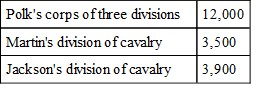
And at New Hope Church, May 26th
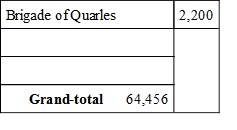
His losses during the month of May are stated by him, as taken from the report of Surgeon Foard.

These figures include only the killed and wounded, whereas my statement of losses embraces the "missing," which are usually "prisoners," and of these we captured, during the whole campaign of four and a half months, exactly 12,983, whose names, rank, and regiments, were officially reported to the Commissary-General of Prisoners; and assuming a due proportion for the month of May, viz., one-fourth, makes 3,245 to be added to the killed and wounded given above, making an aggregate loss in Johnston's army, from Dalton to New Hope, inclusive, of 8,638, against ours of 9,299.
Therefore General Johnston is greatly in error, in his estimates on page 357, in stating our loss, as compared with his, at six or ten to one.
I always estimated my force at about double his, and could afford to lose two to one without disturbing our relative proportion; but I also reckoned that, in the natural strength of the country, in the abundance of mountains, streams, and forests, he had a fair offset to our numerical superiority, and therefore endeavored to act with reasonable caution while moving on the vigorous "offensive."
With the drawn battle of New Hope Church, and our occupation of the natural fortress of Allatoona, terminated the month of May, and the first stage of the campaign.
CHAPTER XVII.
ATLANTA CAMPAIGN—BATTLES ABOUT KENESAW MOUNTAIN
JUNE, 1864On the 1st of June our three armies were well in hand, in the broken and densely-wooded country fronting the enemy intrenched at New Hope Church, about five miles north of Dallas. General Stoneman's division of cavalry had occupied Allatoona, on the railroad, and General Garrard's division was at the western end of the pass, about Stilesboro. Colonel W. W. Wright, of the Engineers, was busily employed in repairing the railroad and rebuilding the bridge across the Etowah (or High tower) River, which had been destroyed by the enemy on his retreat; and the armies were engaged in a general and constant skirmish along a front of about six miles—McPherson the right, Thomas the centre, and Schofield on the left. By gradually covering our front with parapet, and extending to the left, we approached the railroad toward Acworth and overlapped the enemy's right. By the 4th of June we had made such progress that Johnston evacuated his lines in the night, leaving us masters of the situation, when I deliberately shifted McPherson's army to the extreme left, at and in front of Acworth, with Thomas's about two miles on his right, and Schofield's on his right all facing east. Heavy rains set in about the 1st of June, making the roads infamous; but our marches were short, as we needed time for the repair of the railroad, so as to bring supplies forward to Allatoona Station. On the 6th I rode back to Allatoona, seven miles, found it all that was expected, and gave orders for its fortification and preparation as a "secondary base."
General Blair arrived at Acworth on the 8th with his two divisions of the Seventeenth Corps—the same which had been on veteran furlough—had come up from Cairo by way of Clifton, on the Tennessee River, and had followed our general route to Allatoona, where he had left a garrison of about fifteen hundred men. His effective strength, as reported, was nine thousand. These, with new regiments and furloughed men who had joined early in the month of May, equaled our losses from battle, sickness, and by detachments; so that the three armies still aggregated about one hundred thousand effective men.
On the 10th of June the whole combined army moved forward six miles, to "Big Shanty," a station on the railroad, whence we had a good view of the enemy's position, which embraced three prominent hills known as Kenesaw, Pine Mountain, and Lost Mountain. On each of these hills the enemy had signal-stations and fresh lines of parapets. Heavy masses of infantry could be distinctly seen with the naked eye, and it was manifest that Johnston had chosen his ground well, and with deliberation had prepared for battle; but his line was at least ten miles in extent—too long, in my judgment, to be held successfully by his force, then estimated at sixty thousand. As his position, however, gave him a perfect view over our field, we had to proceed with due caution. McPherson had the left, following the railroad, which curved around the north base of Kenesaw; Thomas the centre, obliqued to the right, deploying below Kenesaw and facing Pine Hill; and Schofield, somewhat refused, was on the general right, looking south, toward Lost Mountain.
On the 11th the Etowah bridge was done; the railroad was repaired up to our very skirmish line, close to the base of Kenesaw, and a loaded train of cars came to Big Shanty. The locomotive, detached, was run forward to a water-tank within the range of the enemy's guns on Kenesaw, whence the enemy opened fire on the locomotive; but the engineer was not afraid, went on to the tank, got water, and returned safely to his train, answering the guns with the screams of his engine, heightened by the cheers and shouts of our men.
The rains continued to pour, and made our developments slow and dilatory, for there were no roads, and these had to be improvised by each division for its own supply train from the depot in Big Shanty to the camps. Meantime each army was deploying carefully before the enemy, intrenching every camp, ready as against a sally. The enemy's cavalry was also busy in our rear, compelling us to detach cavalry all the way back as far as Resaca, and to strengthen all the infantry posts as far as Nashville. Besides, there was great danger, always in my mind, that Forrest would collect a heavy cavalry command in Mississippi, cross the Tennessee River, and break up our railroad below Nashville. In anticipation of this very danger, I had sent General Sturgis to Memphis to take command of all the cavalry in that quarter, to go out toward Pontotoc, engage Forrest and defeat him; but on the 14th of June I learned that General Sturgis had himself been defeated on the 10th of June, and had been driven by Forrest back into Memphis in considerable confusion. I expected that this would soon be followed by a general raid on all our roads in Tennessee. General G. J. Smith, with the two divisions of the Sixteenth and Seventeenth Corps which had been with General Banks up Red River, had returned from that ill-fated expedition, and had been ordered to General Canby at New Orleans, who was making a diversion about Mobile; but, on hearing of General Sturgis's defeat, I ordered General Smith to go out from Memphis and renew the offensive, so as to keep Forrest off our roads. This he did finally, defeating Forrest at Tupelo, on the 13th, 14th, and 15th days of July; and he so stirred up matters in North Mississippi that Forrest could not leave for Tennessee. This, for a time, left me only the task of covering the roads against such minor detachments of cavalry as Johnston could spare from his immediate army, and I proposed to keep these too busy in their own defense to spare detachments. By the 14th the rain slackened, and we occupied a continuous line of ten miles, intrenched, conforming to the irregular position of the enemy, when I reconnoitred, with a view to make a break in their line between Kenesaw and Pine Mountain. When abreast of Pine Mountain I noticed a rebel battery on its crest, with a continuous line of fresh rifle-trench about half-way down the hill. Our skirmishers were at the time engaged in the woods about the base of this hill between the lines, and I estimated the distance to the battery on the crest at about eight hundred yards. Near it, in plain view, stood a group of the enemy, evidently observing us with glasses. General Howard, commanding the Fourth Corps, was near by, and I called his attention to this group, and ordered him to compel it to keep behind its cover. He replied that his orders from General Thomas were to spare artillery-ammunition. This was right, according to the general policy, but I explained to him that we must keep up the morale of a bold offensive, that he must use his artillery, force the enemy to remain on the timid defensive, and ordered him to cause a battery close by to fire three volleys. I continued to ride down our line, and soon heard, in quick succession, the three volleys. The next division in order was Geary's, and I gave him similar orders. General Polk, in my opinion, was killed by the second volley fired from the first battery referred to.
In a conversation with General Johnston, after the war, he explained that on that day he had ridden in person from Marietta to Pine Mountain, held by Bates's division, and was accompanied by Generals Hardee and Polk. When on Pine Mountain, reconnoitring, quite a group of soldiers, belonging to the battery close by, clustered about him. He noticed the preparations of our battery to fire, and cautioned these men to scatter. They did so, and he likewise hurried behind the parapet, from which he had an equally good view of our position but General Polk, who was dignified and corpulent, walked back slowly, not wishing to appear too hurried or cautious in the presence of the men, and was struck across the breast by an unexploded shell, which killed him instantly. This is my memory of the conversation, and it is confirmed by Johnston himself in his "Narrative," page 337, except that he calculated the distance of our battery at six hundred yards, and says that Polk was killed by the third shot; I know that our guns fired by volley, and believe that he was hit by a shot of the second volley. It has been asserted that I fired the gun which killed General Polk, and that I knew it was directed against that general. The fact is, at that distance we could not even tell that the group were officers at all; I was on horseback, a couple of hundred yards off, before my orders to fire were executed, had no idea that our shot had taken effect, and continued my ride down along the line to Schofield's extreme flank, returning late in the evening to my head-quarters at Big Shanty, where I occupied an abandoned house. In a cotton-field back of that house was our signal-station, on the roof of an old gin-house. The signal-officer reported that by studying the enemy's signals he had learned the key, and that he could read their signals. He explained to me that he had translated a signal about noon, from Pine Mountain to Marietta, "Send an ambulance for General Polk's body;" and later in the day another, "Why don't you send an ambulance for General Polk?" From this we inferred that General Polk had been killed, but how or where we knew not; and this inference was confirmed later in the same day by the report of some prisoners who had been captured.
On the 15th we advanced our general lines, intending to attack at any weak point discovered between Kenesaw and Pine Mountain; but Pine Mountain was found to be abandoned, and Johnston had contracted his front somewhat, on a direct line, connecting Kenesaw with Lost Mountain. Thomas and Schofield thereby gained about two miles of most difficult, country, and McPherson's left lapped well around the north end of Kenesaw. We captured a good many prisoners, among them a whole infantry regiment, the Fourteenth Alabama, three hundred and twenty strong.
On the 16th the general movement was continued, when Lost Mountain was abandoned by the enemy. Our right naturally swung round, so as to threaten the railroad below Marietta, but Johnston had still further contracted and strengthened his lines, covering Marietta and all the roads below.
On the 17th and 18th the rain again fell in torrents, making army movements impossible, but we devoted the time to strengthening our positions, more especially the left and centre, with a view gradually to draw from the left to add to the right; and we had to hold our lines on the left extremely strong, to guard against a sally from Kenesaw against our depot at Big Shanty. Garrard's division of cavalry was kept busy on our left, McPherson had gradually extended to his right, enabling Thomas to do the same still farther; but the enemy's position was so very strong, and everywhere it was covered by intrenchments, that we found it as dangerous to assault as a permanent fort. We in like manner covered our lines of battle by similar works, and even our skirmishers learned to cover their bodies by the simplest and best forms of defensive works, such as rails or logs, piled in the form of a simple lunette, covered on the outside with earth thrown up at night.
The enemy and ourselves used the same form of rifle-trench, varied according to the nature of the ground, viz.: the trees and bushes were cut away for a hundred yards or more in front, serving as an abatis or entanglement; the parapets varied from four to six feet high, the dirt taken from a ditch outside and from a covered way inside, and this parapet was surmounted by a "head-log," composed of the trunk of a tree from twelve to twenty inches at the butt, lying along the interior crest of the parapet and resting in notches cut in other trunks which extended back, forming an inclined plane, in case the head-log should be knocked inward by a cannon-shot. The men of both armies became extremely skillful in the construction of these works, because each man realized their value and importance to himself, so that it required no orders for their construction. As soon as a regiment or brigade gained a position within easy distance for a sally, it would set to work with a will, and would construct such a parapet in a single night; but I endeavored to spare the soldiers this hard labor by authorizing each division commander to organize out of the freedmen who escaped to us a pioneer corps of two hundred men, who were fed out of the regular army supplies, and I promised them ten dollars a month, under an existing act of Congress. These pioneer detachments became very useful to us during the rest of the war, for they could work at night while our men slept; they in turn were not expected to fight, and could therefore sleep by day. Our enemies used their slaves for a similar purpose, but usually kept them out of the range of fire by employing them to fortify and strengthen the position to their rear next to be occupied in their general retrograde. During this campaign hundreds if not thousands of miles of similar intrenchments were built by both armies, and, as a rule, whichever party attacked got the worst of it.
On the 19th of June the rebel army again fell back on its flanks, to such an extent that for a time I supposed it had retreated to the Chattahoochee River, fifteen miles distant; but as we pressed forward we were soon undeceived, for we found it still more concentrated, covering Marietta and the railroad. These successive contractions of the enemy's line encouraged us and discouraged him, but were doubtless justified by sound reasons. On the 20th Johnston's position was unusually strong. Kenesaw Mountain was his salient; his two flanks were refused and covered by parapets and by Noonday and Nose's Creeks. His left flank was his weak point, so long as he acted on the "defensive," whereas, had he designed to contract the extent of his line for the purpose of getting in reserve a force with which to strike "offensively" from his right, he would have done a wise act, and I was compelled to presume that such was his object: We were also so far from Nashville and Chattanooga that we were naturally sensitive for the safety of our railroad and depots, so that the left (McPherson) was held very strong.
About this time came reports that a large cavalry force of the enemy had passed around our left flank, evidently to strike this very railroad somewhere below Chattanooga. I therefore reenforced the cavalry stationed from Resaca to Casaville, and ordered forward from Huntsville, Alabama, the infantry division of General John E. Smith, to hold Kingston securely.
While we were thus engaged about Kenesaw, General Grant had his hands full with Lee, in Virginia. General Halleck was the chief of staff at Washington, and to him I communicated almost daily. I find from my letter-book that on the 21st of June I reported to him tersely and truly the condition of facts on that day: "This is the nineteenth day of rain, and the prospect of fair weather is as far off as ever. The roads are impassable; the fields and woods become quagmire's after a few wagons have crossed over. Yet we are at work all the time. The left flank is across Noonday Creek, and the right is across Nose's Creek. The enemy still holds Kenesaw, a conical mountain, with Marietta behind it, and has his flanks retired, to cover that town and the railroad behind. I am all ready to attack the moment the weather and roads will permit troops and artillery to move with any thing like life."
The weather has a wonderful effect on troops: in action and on the march, rain is favorable; but in the woods, where all is blind and uncertain, it seems almost impossible for an army covering ten miles of front to act in concert during wet and stormy weather. Still I pressed operations with the utmost earnestness, aiming always to keep our fortified lines in absolute contact with the enemy, while with the surplus force we felt forward, from one flank or the other, for his line of communication and retreat. On the 22d of June I rode the whole line, and ordered General Thomas in person to advance his extreme right corps (Hooker's); and instructed General Schofield, by letter, to keep his entire army, viz., the Twenty-third Corps, as a strong right flank in close support of Hooker's deployed line. During this day the sun came out, with some promise of clear weather, and I had got back to my bivouac about dark, when a signal message was received, dated—
KULP HOUSE, 5.30 P.M.
General SHERMAN: We have repulsed two heavy attacks, and feel confident, our only apprehension being from our extreme right flank. Three entire corps are in front of us.
Major-General HOOKER.
Hooker's corps (the Twentieth) belonged to Thomas's army; Thomas's headquarters were two miles nearer to Hooker than mine; and Hooker, being an old army officer, knew that he should have reported this fact to Thomas and not to me; I was, moreover, specially disturbed by the assertion in his report that he was uneasy about his right flank, when Schofield had been specially ordered to protect that. I first inquired of my adjutant, Dayton, if he were certain that General Schofield had received his orders, and he answered that the envelope in which he had sent them was receipted by General Schofield himself. I knew, therefore, that General Schofield must be near by, in close support of Hooker's right flank. General Thomas had before this occasion complained to me of General Hooker's disposition to "switch off," leaving wide gaps in his line, so as to be independent, and to make glory on his own account. I therefore resolved not to overlook this breach of discipline and propriety. The rebel army was only composed of three corps; I had that very day ridden six miles of their lines, found them everywhere strongly occupied, and therefore Hooker could not have encountered "three entire corps." Both McPherson and Schofield had also complained to me of this same tendency of Hooker to widen the gap between his own corps and his proper army (Thomas's), so as to come into closer contact with one or other of the wings, asserting that he was the senior by commission to both McPherson and Schofield, and that in the event of battle he should assume command over them, by virtue of his older commission.




